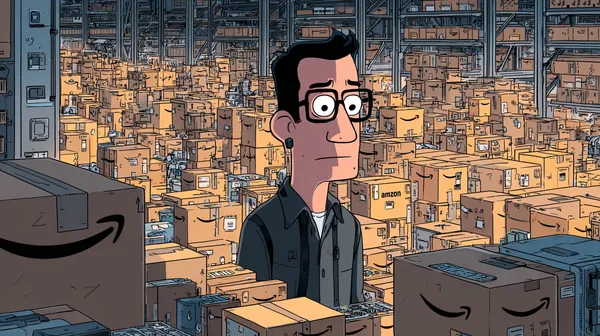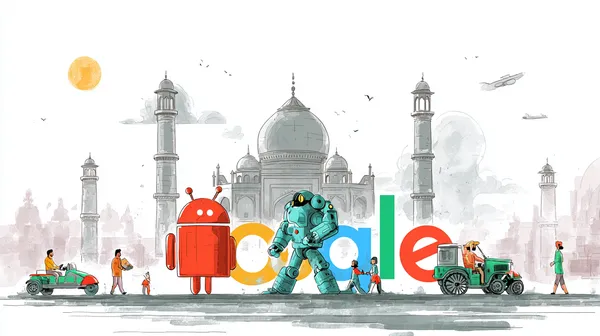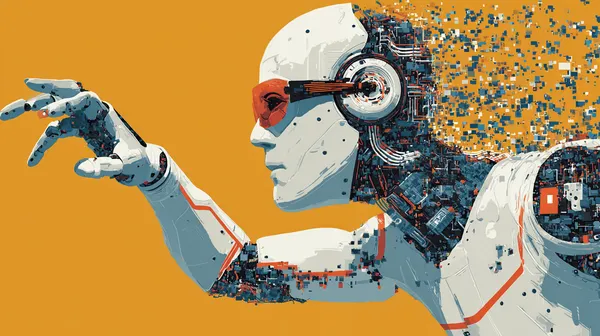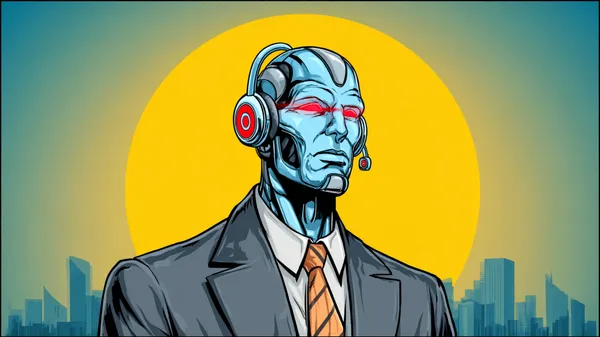
Oct 29, 2025
Corporate Shifts and AI: My Take on Amazon's New Era of Job Cuts
The first time I read about a major workforce reduction linked to AI, I thought it was science fiction. Fast forward to today, and Amazon — a company whose packages have been a near-constant companion throughout my adult life — is letting go of 14,000 corporate workers, mostly thanks to artificial intelligence reshaping their business. Like many, my knee-jerk reaction was worry — not just for those losing jobs, but for how close the AI transformation is hitting home. Here’s my very real, sometimes messy reflection on what Amazon’s latest round of layoffs means in this age of technological disruption. I'll transform this content to make it sound authentically human while maintaining the news tone and first-person perspective. Here's the optimized version:Amazon will cut about 14,000 corporate jobs as the online retail giant ramps up spending on artificial intelligence.About Our Ads Return to HomepageAmazon will cut about 14,000 corporate jobs as the online retail giant ramps up spending on artificial intelligence.About Our AdsAdvertisementAdvertisement Amazon will cut about 14,000 corporate jobs as the online retail giant ramps up spending on artificial intelligence.I've just learned that Amazon plans to slash around 14,000 corporate jobs while simultaneously boosting its investment in artificial intelligence. This massive workforce reduction comes as the tech giant shifts priorities toward AI development - a move that's sending shockwaves through the industry.The Amazon layoffs represent one of the largest corporate workforce cuts we've seen recently. From what I understand, these job cuts aren't happening in isolation. They're directly connected to Amazon's strategic pivot toward AI technologies. But what does this really mean for employees and the company's future?Amazon's corporate restructuring seems to follow a pattern we're seeing across the tech sector. Companies are betting big on AI while trimming what they view as excess personnel costs. I think this reflects a fundamental shift in how major corporations view their workforce needs in an increasingly automated world.The AI impact on Amazon's workforce can't be overstated. These 14,000 positions represent real people with careers, families, and financial obligations. Yet Amazon clearly believes the future lies in artificial intelligence rather than maintaining current staffing levels.Looking at the broader job market changes, this move by Amazon might be a canary in the coal mine. When a company this size makes such dramatic cuts while investing in AI, it signals where they believe the future of work is headed.I've been tracking Amazon job cuts related to AI investments for a while now. This isn't their first reduction, but it's definitely their most significant. The question remains - will these investments ultimately create more jobs than they eliminate? History suggests technological revolutions eventually create new opportunities, but the transition can be brutal.Amazon's corporate workforce has been through a lot in recent years - pandemic-related growth followed by contraction, changing work policies, and now this. Some analysts I've spoken with believe this workforce reduction is just the beginning of a larger trend across the tech industry.What's particularly interesting about these Amazon layoffs is how openly they're connecting them to AI investment. Most companies try to separate these narratives, but Amazon seems to be acknowledging the direct relationship between AI advancement and reduced need for certain types of corporate roles.So what's next? The future of work with AI integration remains uncertain. Will Amazon's gamble pay off? Can AI truly replace the value of 14,000 human workers? And what happens to those displaced by this technological shift?I'll be watching closely as this situation develops. The impact of these Amazon job cuts and AI investments will likely ripple throughout the entire tech sector, potentially reshaping how companies structure their workforces for years to come.TL;DR: In a nutshell: Amazon is cutting 14,000 corporate jobs, citing AI and efficiency—spotlighting both the power and the perils of tech transformation. The workforce is changing, and we’re all passengers on this unpredictable ride.
4 Minutes Read

Oct 29, 2025
Inside Meta’s AI Team Shake-Up: Layoffs, Ambitions, and Open Questions
Meta Cuts 600 AI Jobs While Expanding Language Model Development I just heard some pretty big news today. On October 23, 2025, Meta (you know, Facebook's parent company) is slashing about 600 jobs across their AI division. Yikes. The cuts are hitting several core teams - their Fundamental AI Research unit, product AI folks, and infrastructure teams too. But interestingly, they're keeping their hands off the newer TBD Lab. Alexandr Wang, Meta's chief AI officer, sent out a memo explaining why they're doing this. He basically said they want to streamline how decisions get made. Fewer meetings, more individual responsibility. Makes sense, I guess? Despite these Meta AI layoffs, they're trying to help affected employees find other roles within the company. Most will probably land on their feet somewhere else internally. What's kinda contradictory is that while they're cutting all these AI jobs, Meta's actually expanding their TBD Lab at the same time. This unit is focused on developing their latest large language models (LLMs). You know, the tech behind ChatGPT and stuff. Meta's approach with their Llama model is pretty different from competitors - they've made it semi-open source. This means users can actually access and tweak parts of it, unlike the locked-down systems from OpenAI and Google. But let's be real. Despite this Meta AI innovation, they're still playing catch-up to OpenAI and Google when it comes to getting regular people to use their AI products. Though they do claim over a billion monthly users, which is nothing to sneeze at! This Meta workforce reduction is happening while there's all this debate about slowing down the race toward AI superintelligence. Some pretty big names in tech and business have been saying "hey, maybe we should pump the brakes a bit." And Meta's definition of "open source" with their Llama model? It's raising eyebrows among purists who say it doesn't quite match what open source traditionally means. Meanwhile, there's other tech drama happening - ChatGPT might face super strict EU rules, tech leaders want to pause the AI race, and an Amazon outage showed how dependent Europe is on Big Tech. Oh, and Trump pardoned that Binance founder, while the James Webb telescope found "seeds of life" somewhere out in space. Busy times! The Meta AI team restructuring seems to be about creating more agile teams and getting more impact per employee. But it's happening against this backdrop of intense scrutiny around AI development and big tech influence. I'm curious to see how this plays out - will streamlining their AI division actually help Meta catch up to the competition? Or is this just another tech company cutting costs? What do you think?
3 Minutes Read

Oct 14, 2025
Why Google’s $15B AI Hub in Visakhapatnam Is More Than Just a Data Center
Google to build a $15bn AI data hub in India. This is Google's biggest investment outside the US, the firm's top executive says.Have you heard the news? Google just announced they're building a massive $15 billion AI data hub in India! This isn't just any investment—it's actually Google's largest outside the United States, according to their top exec. I'm honestly pretty excited about what this means for the global AI landscape.The new AI hub will be located in Visakhapatnam, Andhra Pradesh. From what I've gathered, this gigawatt-scale data center campus is going to be a game-changer for India's digital economy. But why Visakhapatnam? Well, it seems the coastal location offers strategic advantages for a project of this magnitude.I think what's really fascinating is how this fits into the bigger picture of AI technology advancements we're expecting by 2025. Google's investment in India signals a major shift in how tech giants are approaching global AI infrastructure development. They're not just focusing on Western markets anymore.The $15 billion investment isn't just about building servers and cooling systems. It's about creating an ecosystem. In my experience following tech developments, these kinds of projects typically create thousands of jobs—from construction workers to engineers to support staff. The economic impact on Visakhapatnam and the broader Andhra Pradesh region could be huge!But let's take a step back. Why is Google making their largest AI hub outside the US in India specifically? It's probably a mix of factors—access to talent, growing digital market, and favorable business conditions. And honestly, the timing couldn't be better as India's tech sector continues to boom.The Google investment in India also raises some interesting questions about the global AI race. Will other tech giants follow suit? How will this affect the balance of AI power globally? These are things I'm keeping my eye on.Construction of the data centre campus in Visakhapatnam is expected to begin soon, though exact timelines aren't super clear yet. What we do know is that once completed, this AI hub in Visakhapatnam, Andhra Pradesh will be one of the most advanced AI facilities in Asia.So what's the bottom line? This $15 billion investment represents more than just another data center. It's a statement about the future of AI technology advancements and where Google sees the most potential for growth. And you know what? I think they might be onto something big with this AI infrastructure development in India.I'll definitely be watching how this project unfolds over the next few years. The impact on both local communities and the broader AI landscape could be transformative. What do you think about Google's massive bet on India's AI future?
3 Minutes Read

Oct 14, 2025
Leapfrogging the AI Gap: Why Canada’s Future Depends on Nurturing Homegrown Talent
Reflecting on Canada's AI Crossroads: We're Losing Our Brightest Minds I've been reading The Globe and Mail's coverage of Canada's AI future lately, and honestly? I'm feeling both pumped up and kinda terrified. We're at this crazy crossroads right now. If we don't wake up and get creative about keeping our smartest people here, Canada's gonna miss the AI revolution just like we totally whiffed on the internet boom back in the 90s. Evan Solomon (our new Minister of AI and Digital Innovation) laid out some pretty brutal facts. Like, seven of America's top 10 companies are tech giants worth a combined US$28.3 trillion. And us? We've got ONE tech company in our top ten, worth a measly US$0.2 trillion. Yikes. That gap isn't just embarrassing—it's a warning sign about our digital sovereignty and future jobs. The government's AI Strategy Task Force sounds good on paper—they talk about research, adoption, commercialization, all that stuff. But it feels like they're using yesterday's playbook. In this new AI economy, the real value comes from people who don't even have companies yet! The Americans figured this out already. They're throwing money at raw talent before there's even a product. I saw this firsthand last September when Silicon Valley made aggressive moves in Toronto. The a16z speedrun swooped in offering Canadian entrepreneurs a million bucks plus $5M in compute credits—but only if they moved to California. A week earlier, Y Combinator (you know, the folks behind Airbnb and DoorDash) held this exclusive event targeting Canadian STEM students. The message was clear: "Come to San Francisco and bring your brains with you." These aren't just nice perks—they're calculated strategies to drain our talent. Every time someone takes these deals, we lose potential IP, jobs, and tax revenue. It's sabotaging our chance at building our own AI sector. And that's scary for our national security too. But look, it's not hopeless. The All In AI conference in Montreal reminded me that Canada's still got game. Our innovation hubs like MaRS Discovery District have the connections to keep talent here. What we're missing is a strategy that beats American offers—real funding, compute data cloud access, and mentorship for early-stage innovators. So what's the path forward? We can't just chase the U.S.—we need to leapfrog ahead. Our government needs to put serious investment in early-stage AI talent adoption. The Americans have shown their hand; now we need a bold Canadian response or we'll watch our future pack up and leave. What do you think? Can Canada attract investment and maintain AI leadership without losing our brightest minds? Or are we doomed to repeat history?
3 Minutes Read

Oct 13, 2025
Wired for Ambition: Inside Meta’s Billion-Dollar AI Talent Blitz and the Data Realities We Click Through Every Day
Meta's $1.5 Billion Engineer: Inside the AI Talent War So I was digging into this whole Meta AI thing the other day, and wow - talk about mind-blowing stuff! The headline that got me? Meta's absolutely wild move in the AI talent race when they hired Andrew Tulloch from Thinking Machines. They're calling him the "$1.5 billion engineer." Like, seriously? That's not a typo! Zuckerberg isn't just hiring people; he's completely redrawing the map of tech influence. I mean, $1.5 billion... that figure just sits there, making my jaw drop every time I think about it. It's what companies are willing to pay now for the brightest minds in AI. What really caught my attention was Meta's creation of this elite 50-person task force focused on AGI (that's artificial general intelligence, btw). The stakes are huge. These tech giants know something most don't - innovation depends on brainpower as much as algorithms. Recruiting has become just as important as the next breakthrough itself. But here's the thing that's equally fascinating to me. Behind all this AI talent offensive is this crazy-complex ecosystem of data collection and privacy management. Every time I browse, my device is sending out tons of data points - IP address, cookies, device IDs, browsing data, and even my location sometimes. All this feeds the AI revolution. Have you ever wondered how long they keep this stuff? It's wild. Some cookies last just a day, others stick around for 5 years! And there are like 148 vendors and 68 ad partners handling all this data - everyone from Amazon Ads to Microsoft to Salesforce. As a user, I actually have some control here. My privacy choices get tracked and stored (ironically enough), and I can change settings pretty easily. But the whole system is designed for advertising, personalization, and improving their services. The sophistication is kinda scary. They can link devices in your household and even pinpoint your location within 500 meters if you consent. All while trying to stay compliant with regulations. So what's the big picture? As Meta pushes forward with their superintelligence labs and that $1.5 billion engineer, there's this massive data ecosystem supporting everything. My digital journey is more personalized than ever - but also more watched. I think what's most important in this data privacy in advertising world is that transparency and control aren't just nice-to-haves. They're essential parts of everything from AGI development to just reading an article online. And that's the real impact of AI on advertising - it's changed everything about how our data gets used. But it's also given us more ways to control it... if we bother to look.
3 Minutes Read

Oct 8, 2025
Oracle AI World: Surprises, Stock Swings, and the New AI Gold Rush
Oracle's AI Revolution: My Take on Their Enterprise AI Strategy I've been watching Oracle lately, and wow - they're making some serious moves in the AI space. Zacks highlighted this back in October, and it's pretty clear Oracle's going all-in on what they're calling "agentic AI." They're basically embedding AI agents throughout their cloud applications to lead the next wave of enterprise software. Smart move. The big moment happened in March 2025 when they launched their AI Agent Studio for Fusion Applications. This thing is no joke. It lets customers build and manage AI agents across finance, HR, supply chain - you name it. They've packed in over 50 pre-built agents, some validation tools, and solid security (which, let's be honest, you absolutely need with enterprise AI). What caught my attention was how Oracle strengthened their Oracle Cloud Infrastructure by integrating 16 new role-based AI agents in their Fusion Cloud CX applications. Think marketing, sales, service - the whole package. And get this - they're not charging extra for these AI features! That's a big deal when most competitors slap premium pricing on anything AI-related. They've also partnered with Google Cloud (announced back in August 2025) to bring Gemini models to their Generative AI service. This gives clients more flexibility while keeping things secure and compliant. Important stuff, especially for regulated industries. But what's really cool about Oracle's agentic AI? It can run complex workflows on its own, boosting productivity without forcing customers to overhaul their systems. The numbers don't lie. Oracle's Q1 fiscal 2026 revenues jumped 12% to $14.9 billion. But here's the crazy part - their performance obligations surged 359% to $455 billion! Four multi-billion-dollar contracts drove that. Talk about validation for their AI strategy! Looking ahead, they're projecting their cloud infrastructure revenues will hit $18 billion in fiscal 2026 - a 77% increase. And their stock? Up 75% year-to-date, crushing the broader tech sector and competitors like Microsoft, Alphabet, and Amazon. But there's always a catch, right? Oracle's trading at a P/E of 43.09x, way above the industry average. That's pretty steep. The big hyperscalers aren't sitting still either - Microsoft has Copilot, Amazon has Bedrock, and Google has Vertex AI Agent Builder. So what's my take? Oracle's focus on database-centric workloads and application-embedded agents gives them a unique position in Enterprise AI. Their integration of AI throughout workflows is impressive. But that valuation? Yikes. If you're already holding shares (like me), I'd stick with it through the ups and downs. For new investors though? Maybe wait for a better entry point. Oracle's embrace of agentic AI is paying off so far. But in this competitive landscape, can they maintain the momentum? That's the million-dollar question.
3 Minutes Read

Oct 8, 2025
Canada’s AI Road Trip: How OpenAI is Navigating Sovereignty, Partnerships, and Progress
I've been thinking about The Logic's recent coverage from October 7, 2025. It's fascinating to see how OpenAI is becoming such a key player in Canada's push for sovereign AI. At the Elevate conference in Toronto, Chris Lehane (OpenAI's global affairs guy) talked about being a "constructive partner" to Canada amid all this geopolitical tension. And honestly? The whole situation's gotten pretty intense with Trump's administration pushing for total "technological dominance" through that AI Action Plan. No wonder Canada's looking to break away from Silicon Valley dependence.Mark Carney's Liberal government gets it. They're pouring serious cash—$2 billion!—into compute capacity and promising to buy more Canadian tech. I think that's smart. AI Minister Evan Solomon has this great line about how "sovereignty is not solitude." That really hits the nail on the head. Canada still needs partners like OpenAI, even while building its own thing.So what's OpenAI actually doing? Our "OpenAI for Countries" program launched back in May adapts ChatGPT to reflect local customs and government needs. We're also offering to build data centers with countries willing to co-invest. It's already working elsewhere—look at the massive US$500-billion Stargate Project in the UK and UAE. We've also got data centers in Germany and Norway, plus school programs in Estonia and Greece. Pretty flexible approach, right?In Canada specifically, we're talking with investors and infrastructure providers. Dev Saxena (our Ottawa-based advisor) keeps emphasizing the need for a "critical mass of demand" in these sovereign compute projects. Because let's face it—no country can build the entire AI stack alone. The supply chains are just too international.Canada's got some serious advantages though. Great energy generation, amazing AI talent in Toronto and Montreal, and plenty of investment capital. But here's the thing—traditional industries like forestry and healthcare need to get on board too. Otherwise, what's the point?The whole AI ecosystem in Canada is getting crowded. Cohere's expanding in Ottawa, French company Mistral AI is hunting for Canadian talent, and Meta's building that huge Alberta data centre with Pembina. Competition's heating up!What makes our strategic partnership approach different is our commitment to democratic values in AI development. We support systems that align with democracy, not the authoritarian version from China. As Lehane says, AI development could actually let everyone win through global AI solutions deployment—not just the usual zero-sum game.By October 2025, I'd say OpenAI's become crucial to Canada's sovereign AI vision through our tailored partnerships and technical support. Our experience with AI infrastructure worldwide makes us a natural ally for countries navigating this tricky balance between tech advancement and digital sovereignty. It's all about finding that sweet spot between domestic strength and international collaboration.
3 Minutes Read

Oct 8, 2025
Bridging Languages and Perspectives: My Take on Canada’s GCtranslate AI Pilot
Canada's AI Translation Tool: My Take on the GCtranslate Pilot I've been looking into Canada's latest tech initiative, and it's pretty interesting. The federal government of Canada just kicked off a pilot project using an AI translation tool called GCtranslate in six departments. Joël Lightbound, who's the Minister of Government Transformation, made the announcement Monday. It's actually the first big project from the Treasury Board's AI Strategy. No exact start date yet, but they're clearly testing the waters before a bigger rollout. Prime Minister Mark Carney's government is really pushing for productivity increases across the public sector. And they've already done some testing! Back in June, GCtranslate translated over 60 million words in just three months. That's like 3,000 pages every workday. Pretty impressive, right? Lightbound says the tool "strengthens the use of both official languages" and helps modernize public service. But not everyone's thrilled about this public service modernization effort. Nathan Prier from the Canadian Association of Professional Employees (one of the big public service unions) has serious concerns. He thinks it could hurt the quality of French translations and impact francophone communities. In his view, full automation is "a very bad idea" when it comes to preserving the nuances of French. I think he makes a good point - AI translation tools sometimes miss the subtleties that human translators catch. Prier believes the main motivation is just cost-cutting. He argues that GCtranslate should complement human translators, not replace them. These professionals have decades of experience and are, in his words, the "foundation of bilingualism in Canada." The lack of consultation with translation experts seems to be a sore point too. But the government's defending their AI translation tool. They say professional translators evaluated it and that it uses the Translation Bureau's extensive word catalogue. And get this - they're even planning to explore using similar AI technology for Indigenous languages in the future. That could be a game-changer for linguistic accessibility beyond just the two official languages. The pilot's happening in six departments, including the RCMP and Department of Finance Canada. Eventually, they want GCtranslate implemented across all federal sectors. So what's the bottom line? The federal government of Canada is betting on AI to boost bilingual services and efficiency. But there's a real tension between innovation and preserving linguistic integrity. Will GCtranslate enhance or diminish Canada's commitment to quality bilingualism? That's the million-dollar question. As this AI Strategy Canada initiative moves forward, I'll be watching to see how they balance cutting-edge technology with the human touch that makes translation truly effective. What do you think about using AI for government translation services?
3 Minutes Read

Oct 4, 2025
What IBM, AMD, and Zyphra Are Quietly Teaching Us About the Future of Open AI (and the Markets)
IBM and AMD Team Up with Zyphra: A Game-Changer for Open-Source AI.So I just heard some pretty exciting news in the tech world! IBM and AMD have joined forces in this multi-year partnership to boost Zyphra's AI operations. Never heard of Zyphra? They're this promising AI startup focused on open-source development that's been making waves lately. They actually hit unicorn status with a $1 billion valuation after their Series A funding. Pretty impressive, right?The deal is fascinating. IBM's hosting a massive cluster of AMD's Instinct MI300X GPUs on their cloud platform. This setup is gonna help Zyphra train these incredibly complex AI models that can handle text, visuals, and audio all at once. I think it's one of the biggest AI training projects using AMD's complete tech stack that I've seen so far.What's Zyphra actually doing? They're building what they call an "open-source/open-science superintelligence lab." Sounds like sci-fi, but it's real! Their research targets advanced neural networks, long-term memory, and continuous learning. Their big goal is launching something called Maia - a "superagent" that understands language, images, and sound. The whole point is making enterprise workers more productive through AI assistance.But this partnership goes beyond just cool tech. Zyphra's CEO (Krithik Puthalath) seems super proud about being first to use AMD's full-stack AI training platform on IBM Cloud. And honestly, why wouldn't he be? The first phase already kicked off in September, with more stages planned for 2026. That's some serious long-term planning!On the investment side, this news comes at an interesting time. IBM's sitting at a "Moderate Buy" rating on Wall Street - 6 Buys, 6 Holds, 1 Sell over the last three months. Their average price target is $293.58, suggesting about 3.7% upside potential. Not bad, considering everything that's happening in the market right now.Speaking of the market... it's been wild! Apple's getting positive reactions for their Services business, BlackRock's closing in on a deal with Aligned Data Center, and Tesla stock dipped despite expanding into Qatar. Weird how that works sometimes, isn't it?I'm particularly interested in how this IBM-AMD partnership with Zyphra will play out. It really shows where the industry's headed - toward greater AI capability through open-source innovation and cutting-edge hardware. As someone who follows these trends, I'll be watching closely as these project phases unfold toward 2026.Have you been following any of these open-source AI models or the companies developing them? I'd love to hear your thoughts!
3 Minutes Read

Oct 4, 2025
AI Shopping in Conversation: OpenAI’s Gambit and the Future of Everyday Commerce
ChatGPT's New Shopping Feature Just Changed How We'll Buy Stuff OnlineWow. OpenAI just went on a serious tech rampage this week. In just two days, they've basically declared war on Google, Amazon, Meta, and TikTok all at once. Like, who does that?So here's what happened. On Monday, OpenAI rolled out this shopping thing in ChatGPT that lets you buy stuff from Etsy sellers without ever leaving the chat. Pretty slick. Then on Tuesday, they dropped Sora - their AI video app that's basically TikTok but with AI-generated videos instead. Bold moves from Sam Altman's crew.Let's talk about that ChatGPT shopping integration first. I've been playing with it, and it's actually super convenient. You just ask ChatGPT about products, and boom - you can buy right there in the conversation. No more bouncing between tabs or apps. The Instant Checkout feature makes it dangerously easy to spend money (my wallet is already crying).What's really interesting is how this directly challenges both Google and Amazon at once. Google's been doing shopping suggestions in search forever, and Amazon's whole thing is making purchases frictionless. But now ChatGPT (with its ridiculous 700 million weekly users) is creating this AI-powered marketplace that combines both approaches. And they're using what they call an "Agentic Commerce Protocol" to handle secure transactions.The Etsy direct purchases are just the beginning. OpenAI mentioned "other prominent merchants" are coming soon. I think this conversational commerce approach might actually stick - it feels natural to ask for recommendations and then buy in the same place.But the Sora app? That's where things get wild. It's basically an endless feed of AI-generated videos created from text prompts. Kinda like if TikTok and DALL-E had a baby. The videos look insanely real too - some OpenAI employee posted one showing Sam Altman trying to rob a Target. It wasn't real, obviously, but it looked convincing!What I find fascinating is Altman's honesty about Sora. He straight-up admitted it could become addictive or enable bullying. He even said they'd kill the whole project if users don't feel their lives are better after using it. When's the last time you heard a tech CEO talk like that?These moves aren't happening in isolation either. OpenAI is building a massive tech empire right before our eyes. They're already working on a LinkedIn competitor, planning huge infrastructure upgrades, and maybe even making devices someday.So what's this all mean for us? The line between chatting, shopping, and entertainment is disappearing fast. Soon we'll just talk to AI about what we want, and it'll handle everything else. Buy it in ChatGPT today, watch AI-generated videos tomorrow. The future's getting weird, folks.Have you tried the new ChatGPT shopping integration yet? I'm curious if you think it'll actually replace traditional online shopping or if it's just another tech gimmick.
3 Minutes Read
